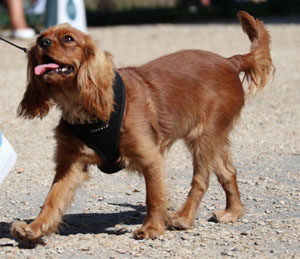Dog Behavioural Issues – What are They Eating?
 Does your dog have behavioural issues? Are you at your wits end trying to figure out why he or she is being so aggressive / destructive / anxious / hyper / insert-other-behavoural-issue-here? Maybe it’s time to look at their diet.
Does your dog have behavioural issues? Are you at your wits end trying to figure out why he or she is being so aggressive / destructive / anxious / hyper / insert-other-behavoural-issue-here? Maybe it’s time to look at their diet.
We recently attended a Vancouver Parks Board seminar for pet owners featuring guest expert Dr. Rebecca Ledger. Dr. Ledger is an Animal Behaviour & Welfare Scientist who spoke about the science of food, and how a dog’s diet can influence behaviour. Her goal was to help the audience of pet owners understand what their dogs need for brain health, and how we can help them get what they need nutritionally in order to live their best dog life.
Like Humans, Dogs Thrive On a Well-Rounded Diet
Though there’s a general trend for pet owners to feed high protein diets (such as a raw-food diet) to their dogs, they need other nutrients such as carbohydrates, fats, fibres, minerals & vitamins in order to feel their best. Their brain chemistry, and their  behaviour as an outcome, is affected by what they’re getting or missing from their diets. They need food that gives them both access and the ability to absorb important nutrients to produce other chemicals; enzymes, hormones, and neurotransmitters.
behaviour as an outcome, is affected by what they’re getting or missing from their diets. They need food that gives them both access and the ability to absorb important nutrients to produce other chemicals; enzymes, hormones, and neurotransmitters.
Like humans, dogs can’t ingest and process all of the nutrients they need through one single food group. They need a balanced diet of protein-fat-carb-fibre. Most adult dogs that are family pets would require a diet that is around 20% protein. Tipping the scales in any one direction (such as an all-meat or all-veggie diet) will limit the availability or processing of important brain-builders, potentially leading to behavioural issues.
Dogs Get Hangry Too
Have you ever been hungry-angry, or ‘Hangry’? Your stomach feels empty, you’re not satiated at all, and everything makes you feel edgy and frustrated. Perhaps you ate a light salad for lunch and can’t make it through to dinner. Maybe all you had time for at breakfast was a boiled egg and it’s left you feeling empty. If you’re a dog, how would you behave? Would you anxiously guard your food bowl because you’re hoping for a few more bites? Maybe you’d become aggressive and irritable at the movement or noise coming from a person or another dog. Maybe you’d start scrounging around on the ground in search of a few extra morsels. Dogs on high-protein diets tend to lack the bulk they need that makes them feel full – they’re missing the fibre and carbs that are literally filling their stomachs and making them satisfied. The result? Hangry dog.
Conversely, dogs that are not getting enough protein in their diets are missing the amino acids that help them make and release ‘feel good’ chemicals such as dopamine and serotonin. Lower levels of these important chemicals may result in a dog that is more reactive, more stressed, and more anxious. They may be less eager to learn, hesitant to try new things or meet new people, and more lethargic.
Finding The Balance – What to Feed Our Dogs
 The ratio between dietary compounds is the key to good dog behaviour. This means that a well rounded diet is better for brain health. If your dog is on a raw diet, consider integrating other whole foods into the meal plan so they can absorb the amino acids provided by the protein. If you’re feeding your dog a specific type of dry food, check the label for ingredients and ratios. You’ll want to read the ‘guaranteed analysis’ on the package, not just the marketing splash on the packaging.
The ratio between dietary compounds is the key to good dog behaviour. This means that a well rounded diet is better for brain health. If your dog is on a raw diet, consider integrating other whole foods into the meal plan so they can absorb the amino acids provided by the protein. If you’re feeding your dog a specific type of dry food, check the label for ingredients and ratios. You’ll want to read the ‘guaranteed analysis’ on the package, not just the marketing splash on the packaging.
Most adult dogs need a diet that consists of around 20% protein. Proteins that are a good source of tyrosine – a building block to produce dopamine – include soy, chicken, turkey, fish, pumpkin seeds and sesame seeds.
Fillers aren’t bad – they are what helps the animal feel full after eating. Fillers include fibre and carbohydrates. When looking at package labels, go for fibres that are insoluble and help with defecation – whole grains, nuts & seeds, wheat and potato skins. Note that soluble fibres such as oats, barley, fruits and legumes will ferment in the colon and could cause gas. The carbohydrates that help with absorption of important nutrients are those with a high glycemic index – sweet potatoes, yams, or brown rice, to name a few.
Supplementing with probiotics and omega-3 fatty acids can lower cortisol levels, helping calm an anxious or edgy dog.
Behavioural Issues Can Be Resolved with Changes in Diet
Did you know that vets are regularly asked to euthanase healthy pets? A 2016 report from the British Veterinary Association (BVA) found that 98 per cent of vets have been asked to euthanase healthy pets, with bad behaviour on the part of the pet being the reason for the euthanasia request. It’s important to know that dietary adjustments can result in dramatic behavioural changes that could help prevent these requests.
If you’re feeding your dog a balanced diet and they’re still presenting concerning behavioural issues, dietary supplements (nutraceuticals) can give them the nutrients they might be missing. Your vet or a behavioural expert such as Dr. Ledger can work with you to tweak diet and add supplements that will literally change your dogs life, and therefore yours as well.
Follow Dr. Ledger on Twitter
PS. Fun Fact – did you know that the average dog has stools 2.7 times per day?
